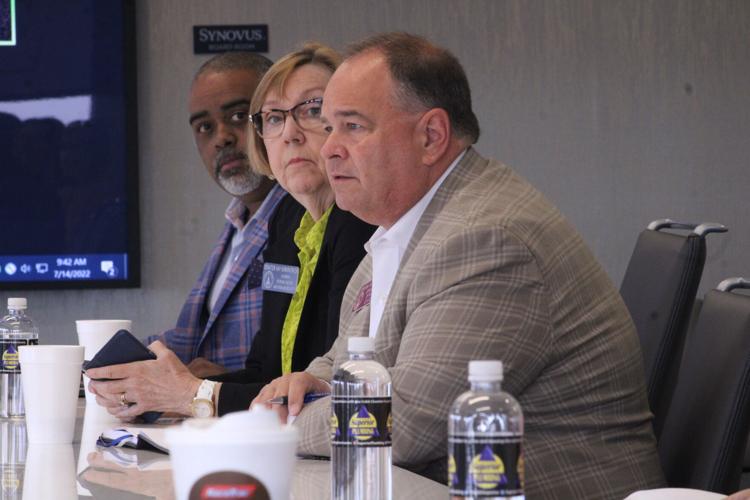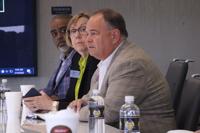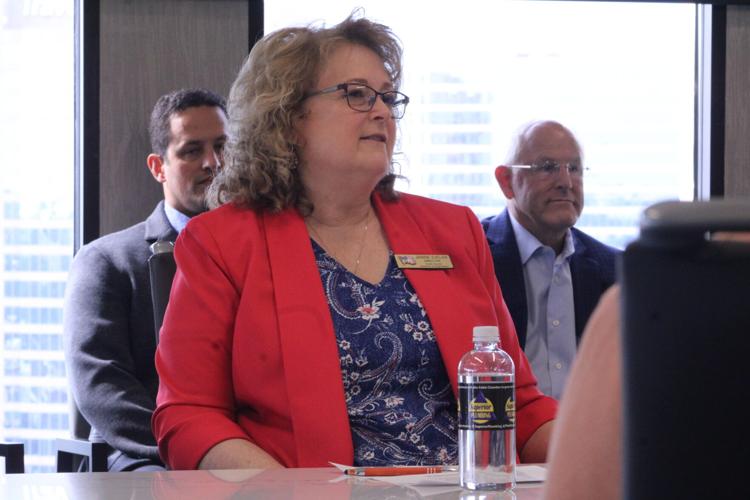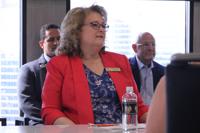CUMBERLAND — More than a year after Georgia lawmakers passed Senate Bill 202, the state’s controversial slate of election law changes, Cobb County’s elections head told the county’s legislative delegation she’s still sorting out new problems the law created.
Difficulties with absentee ballot applications, shortened time frames for runoff elections, and volunteer shortages for ballot review panels are three of the biggest issues the county’s faced in the handful of elections in the last year, according to Elections Director Janine Eveler.
Passed by Georgia Republicans in 2021, Gov. Brian Kemp has repeatedly hailed SB 202 as making it “easy to vote and hard to cheat.” Gubernatorial hopeful Stacey Abrams and Democratic allies, dubbed the measures “Jim Crow 2.0.” The bill’s passage led to Major League Baseball pulling the 2021 All-Star Game out of Cobb, moving it to Denver.
Eveler presented her concerns to a half dozen of Cobb’s state representatives and senators at a meeting at the Cobb Chamber of Commerce’s offices Thursday morning, while other legislators attended virtually. Eveler said she was invited at the request of State Rep. Erick Allen, D-Smyrna, chairman of the 21-member delegation.
Among SB 202’s changes to the elections code was the elimination of an online portal for absentee ballot applications, instead requiring a “pen and ink” signature on the forms. Those must necessarily be printed and either mailed or sent electronically.
Eveler said the elimination of the online portal has made the application process harder on both ends.
“The portal could be a true web input, which is what it was before, where you are asked to fill in each of the fields. And then … there’s a required field, so you can’t miss a field,” she said.
But now, if an applicant leaves a line blank, the elections office goes back and forth with the voter to try and correct the issue.
“So many people today don’t even own a printer,” Eveler added.
“We brought that up during the (SB 202) hearings,” chimed in state Rep. Teri Anulewicz, D-Smyrna.
Adding to the burden on elections workers are new rules for so-called “ballot duplication” panels, three-member groups tasked with reproducing ballots that are unable to be scanned as completed. SB 202 requires those panels be made up of one elections worker, and one volunteer each from the Democratic and Republican parties. But, Eveler said, there’s sometimes issues with the local parties being able to recruit enough volunteers.
Without party volunteers in place, the duplications grind to halt.
“There’s no plan B for us to step in, and duplicate on our own … and I would never accuse anybody of this,” Eveler added, “but it’s an opportunity for a party to stop the whole process by not showing up.”
State Rep. Devan Seabaugh, R-Marietta, suggested legislators themselves could help recruit volunteers to man the ballot-counting operations. That idea received pushback from his colleague, state Rep. David Wilkerson, D-Powder Springs, who preferred sending open letters from the delegation to the heads of the local parties on the issue.
“I don’t know as elected officials that we need to be responsible for sending people there … I’m just hesitant for us to be getting in the middle of an election process,” Wilkerson said.
There’s then the complications added by shortening the runoff period from nine weeks to four, Eveler said, and setting the primary elections during the last week of May.
“The timeframe of the general primary, and the time between primaries and run offs or (general) elections and runoff — those are both causing us big headaches,” Eveler said.
The issue was flagged after the May 24 primary by Cobb Democratic Chair Jacquelyn Bettadapur, who said the short window didn’t allow enough time to request and return absentee ballots.
One solution Eveler suggested would be either moving the primary to mid-May or early June to avoid conflicting with the myriad events at the end of the school year.
She also proposed providing the same “ranked choice” ballots to seniors and disabled voters — who depend most heavily on absentee ballots — that are sent to overseas and military voters. Those ballots ask the voter to rank candidates in order of preference. The ballots negate the need to cast a vote in a runoff by giving the voter’s support to their next choice on the list if their top choice candidate is eliminated.
Eveler said the system has so far “worked pretty good” for overseas and military voters.
Asked by state Sen. Kay Kirkpatrick, R-east Cobb, whether Eveler had presented her concerns to the secretary of state’s office, Eveler said she had not.
“It depends on the political capital at the time,” Eveler replied. “Sometimes they are (receptive), and sometimes they are not, because there are things that are worth fighting about and things that are not.”
Kirkpatrick seemed to take umbrage at the implication, later saying she’d been texting with a secretary of state staffer who’d said “that they would, of course, be happy to meet with you to hear all your concerns.”













(3) comments
It's the LAW. You have a JOB. Get to WORK.
Evaler is obviously in over her head, but her office also needs to be investigated by a GRAND JURY. There were too many irregularities in the past elections with plenty of witnesses to them. My favorite was the coordinated cheering at one location we witnessed every time a minority person voted for the first time -- announcements by polling personnel with appeals for applause! We were shocked.
Thank goodness our republican state legislators "fixed" the non-existent problem we had with "election integrity" - anything to appease Lord Trump...what a joke.
Welcome to the discussion.
Log In
Keep it Clean. Please avoid obscene, vulgar, lewd, racist or sexually-oriented language.
PLEASE TURN OFF YOUR CAPS LOCK.
Don't Threaten. Threats of harming another person will not be tolerated.
Be Truthful. Don't knowingly lie about anyone or anything.
Be Nice. No racism, sexism or any sort of -ism that is degrading to another person.
Be Proactive. Use the 'Report' link on each comment to let us know of abusive posts.
Share with Us. We'd love to hear eyewitness accounts, the history behind an article.